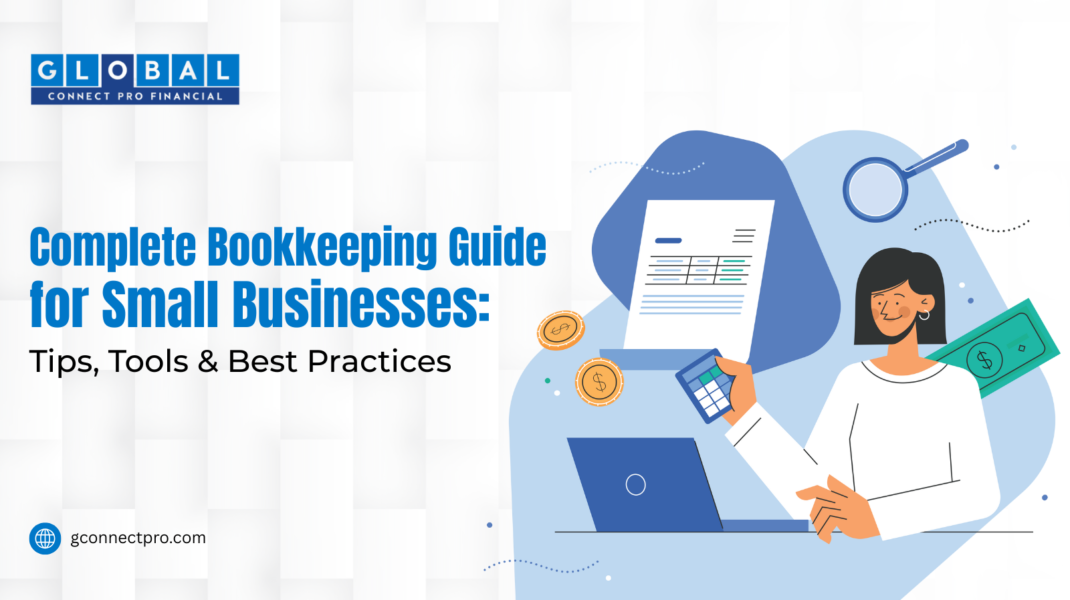Complete Bookkeeping Guide for Small Businesses: Tips, Tools & Best Practices

Bookkeeping is the unsung hero of small business success. It’s not just about tracking income and expenses — it’s the foundation for making smart decisions, staying tax-compliant, and securing funding. Yet many small business owners find themselves overwhelmed by the thought of managing their books. The good news? With the right knowledge, tools, and habits, bookkeeping doesn’t have to be intimidating.
In this complete guide, we’ll break down everything small business owners need to know about bookkeeping — from essential tips and software tools to best practices that save time and money.
What Is Bookkeeping?
Bookkeeping is the process of recording all financial transactions in your business — including sales, purchases, payments, and receipts. It helps you monitor cash flow, analyze business performance, and prepare accurate tax filings.
For small businesses, effective bookkeeping is crucial for:
- Tracking profitability
- Making informed financial decisions
- Meeting tax obligations
- Avoiding penalties and audits
- Attracting investors or lenders
Bookkeeping vs. Accounting: What’s the Difference?
While the terms are often used interchangeably, bookkeeping and accounting serve different functions.
- Bookkeeping involves recording daily financial transactions.
- Accounting interprets, classifies, analyzes, and reports on that data — often with the help of a professional accountant.
Bookkeeping is the groundwork; accounting is the big picture.
DIY Bookkeeping vs. Hiring a Pro
When to do it yourself:
- You’re just starting out
- You have very few transactions
- You’re using user-friendly software like QuickBooks or Wave
When to hire a bookkeeper:
- You’re growing and can’t keep up
- Your finances are becoming complex
- You want to focus on business growth, not data entry
Essential Bookkeeping Tips for Small Business Owners
01. Separate Business and Personal Finances
- Open a dedicated business bank account
- Use a business credit card for business-related purchases
02. Choose the Right Bookkeeping Method
- Cash Basis: Record income when received and expenses when paid.
- Accrual Basis: Record income and expenses when they are incurred, not when money changes hands.
03. Track Every Expense
- Categorize expenses properly (e.g., utilities, travel, marketing)
- Save receipts — use cloud storage or apps like Expensify
04. Stay Consistent
- Set a weekly time slot to update your books
- Regular maintenance avoids end-of-year stress
05. Use Cloud-Based Bookkeeping Software
- Automate data entry, invoicing, and reconciliation
- Ensure real-time access from anywhere
Top Bookkeeping Tools for Small Businesses
01. QuickBooks Online
- Industry leader
- Great for invoicing, bank reconciliation, payroll
02. Xero
- Intuitive interface
- Excellent for collaboration with accountants
03. Wave Accounting
- Free and powerful
- Ideal for freelancers and solo entrepreneurs
04. Zoho Books
- Seamless integration with other Zoho tools
- Affordable for small teams
05. FreshBooks
- Perfect for service-based businesses
- Strong time-tracking and client management features
Common Bookkeeping Mistakes to Avoid
- Procrastinating — letting receipts pile up
- Misclassifying expenses — leading to inaccurate tax deductions
- Not reconciling bank accounts — missing discrepancies
- Ignoring unpaid invoices — which hurts cash flow
- Failing to back up data — risking loss of critical financial records
Best Practices to Keep Your Books Clean and Accurate
01. Automate Where Possible
- Connect bank accounts to your software
- Set up recurring invoices and bill payments
02. Review Financial Reports Monthly
- Track your profit & loss, balance sheet, and cash flow
- Spot trends and catch issues early
03. Reconcile Bank Statements
- Ensure your records match the bank’s
- Do this at least once a month
04. Plan for Taxes Year-Round
- Set aside a percentage of income for taxes
- Keep track of deductible expenses from day one
05. Hire a Professional for Annual Review
- Even if you DIY bookkeeping, an accountant can review your books annually to ensure accuracy
Final Thoughts
Bookkeeping might not be glamorous, but it’s a critical component of a healthy business. With clear habits, modern tools, and a bit of discipline, even first-time entrepreneurs can stay on top of their finances.
Remember, keeping accurate financial records isn’t just about avoiding audits — it’s about empowering yourself with data to grow smarter and faster.
Whether you handle it yourself or delegate it to a pro, investing in good bookkeeping today will save you time, money, and stress tomorrow.

